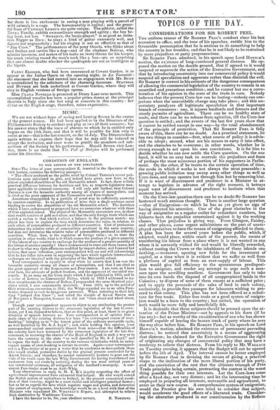CONDITION OF ENGLAND.
TO THE EDITOR OP THE SPECTATOR.
SIR—The letter of your correspondent Z, inserted in the Spectator of the 14th instant, contains the following passage- " The effects produced on the public mind by Colonel Torrens's recent pub- lications seem calculated to give, and indeed have given, new force to the almost exploded absurdities of the old Mercantile school. In fact, there is little practical difference between its doctrines and his, as respects legislative mea- sures applicable to external commerce. I will only add further, that Colonel Torrens is now the favourite authority among all classes of monopolists, and is cited as the great opponent of the Economists and Free-traders.' Assertions unsupported by a particle of proof may be sufficiently answered by counter-assertion. In no publication of mine does a single sentence occur tending to revive the absurdities of the old Mercantile school. The doctrines which I have endeavoured to propound have no connexion whatever with those of that exploded school. The object of the Mercantile economists was, to show that wealth consists of gold and silver, and that the only foreign trade which can enrich a nation is that which realizes a balance in the precious metals : my object has been to explain the laws which determine the value, in relation to each other, of commodities produced in different countries. Cost of production determines the relative value of commodities produced in the same country, but does not determine the relative value of commodities produced in different countries. What, then, is the regulator of foreign value ; or, to state the question in other words, what is it which causes the produce of a given quantity of the labour of one country to exchange for the produce of a greater quantity of the labour of another country? I have endeavoured to trace out these causes, and to show in what way their efforts are modified by import-duties; and I cannot but believe, that upon reflection, your correspondent will see and will acknowledge that he has fallen into error in supposing the laws which regulate international exchanges are identical with the principles of the Mercantile school. Your correspondent is equally in error when be asserts that I am now the favourite authority among all classes of monopolists, and that I am cited as the great opponent of the Economists and Free-traders. I am now, as I have ever been, the advocate of perfect freedom, and the opponent of one-sided mo- nopoly. In an essay on the Corn-trade which I first published in 1815, and in a series of Letters on Commercial Policy, which in 1833 I addressed to my then constituents the electors of Bolton, I propounded the same identical prin- ciples which I now consistently maintain. From 1815, up to the period of their miraculous conversion in 1841, the Whigs regarded me as an ultra Free- trader, disposed to rush to dangerous extremes. When tottering to their fall, they "jumped Jim Crow "; and called the disciple of ADAM SMITH and of RICARDO a Monopolist, because he did not "turn about and wheel about, just so."
Though your correspondent appears to object to my attributing the greater part of the existing distress to the erroneous legislation of the late Govern- ment, yet I am disposed to believe, that on this point, at least, there is no great diversity of opinion between us. Your correspondent is of opinion that a main cause of the existing distress has been "an extravagant course of over- banking," bringing us to " the lowest point of the ordinary mercantile cycle, so well described by Mr. S. J. Loyd"; and, while holding this opinion, your correspondent cannot consistently dissent from mine—that the difficulties of the country have been increased by the erroneous legislation of the late Go- vernment, in renewing the charter of the Bank of England in such a way as to leave the currency in the state " so well described by Mr. S. J. Loyd," and to expose the trade of the country to the ruinous vicissitudes which an extra- vagant course of over-banking is certain to create. Again—your corrrespond- ent is a Free-trader of so pure a water that he condemns as monopolists those who would abolish protective duties by the gradual process contended for by ADAM Sanyo ; and therefore, be cannot consistently hesitate to pour out the vials of his wrath upon the late Whig Government for having transformed our customers into our rivals by resisting, during the ten most critical years of our commercial existence, all mitigation of the landlord's monopoly. A con- sistent Free-trader must be an Anti-Whig. Your observations in reply to M. T. B.'s inquiry respecting the effect of agricultural improvement have exhausted that lubject. He who would extend the Scotch system of agriculture to Ireland, in the present economical condi- tion of that country, might be a most skilful and intelligent practical farmer ; bat as far as regards the laws which regulate wages and profits, and determine the extent of employment, his knowledge would be on a level with that of the Minister who repudiated Dr. WHATELY'S Report, and attempted to, relieve Irish destitution by Workhouse Unions. I bare the honour to be, Sir, your obedient servant, R. TORRE/03.


























 Previous page
Previous page